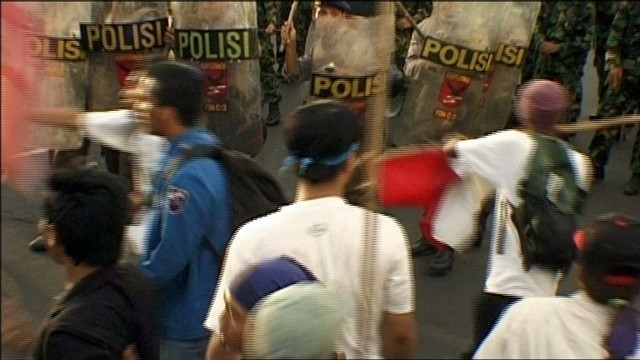21st Century War
Indonesia's bankruptcy leads to chaos
 Arguably globalisation did everyone a favour by melting down the economy of Indonesia because it laid bare the country's despotism and corruption. The tragedy is that globalisation didn't just flatten the crony capitalists, but also the ordinary people who had just been working hard according to the local rules. The question now is whether institutions like the IMF can take advantage of the moment, or whether it will squash them into the ground; whether ultimately the IMF cares only about the interests of powerful countries and corporations....
Arguably globalisation did everyone a favour by melting down the economy of Indonesia because it laid bare the country's despotism and corruption. The tragedy is that globalisation didn't just flatten the crony capitalists, but also the ordinary people who had just been working hard according to the local rules. The question now is whether institutions like the IMF can take advantage of the moment, or whether it will squash them into the ground; whether ultimately the IMF cares only about the interests of powerful countries and corporations....
Nyadi, the manager of a Jakarta shelter house, told us about an incident that happened last week. "Five of our homeless teenage boys got on a bus, pretending to be pengamen or buskers. Just outside the station, they take out knives and start to rob the terrified passengers." People in cars noticed that the bus has stopped in the middle of the road and realised what was going on. A crowd formed, dragged the boys off the bus, beat them up and then set them on fire - burnt them to death right there in the street. They were only about 14-15 years old! They should have been in school."
Violence like this is so commonplace the newspapers don't bother to report it, according to Yusuf Arifin of the Jakarta Post newspaper: "That was the 80th incident involving mob aggression this month. Young pickpockets are killed everyday, at the central bus and train stations. Money is so hard to come by, people are very angry when they catch a thief. We don't bother reporting it in the paper anymore. It's bad for business."
Indonesia, the most lavish of the Asian tiger economies that boomed through the greed-is-good years of the Eighties, finally went bust in 1998. 75% of the country's businesses went to the wall. Banks collapsed. The Rupiah (currency) went into free-fall. Rioting students and citizens forced General Suharto out of power after a 32 year dictatorship. The IMF stepped in to pick up the pieces. Then things got worse.
"When we signed the deal with the IMF we didn't realise the real burden of implementing it," says Dr Sri Mulyani Indrawati, senior government economic advisor. "We have to pay half our Gross Domestic Product just to service our debt." Standing at $147 billion, Indonesia's is the largest national debt in the world. The figures are boggling - $59 billion should have been repaid in 1998, no re-scheduling has been agreed. Sitting in his marble-clad skyscraper office, Josh Felman of the IMF points out that "Indonesia has got to balance the books. They have to make some structural readjustments".
Wardah Hafidz, active in the newly sprouting slums of Matraman district sees it another way. "The IMF tell us we must sell what's left of the country's silver and slash Public Spending - health, education, food and fuel subsidies. That sounds easy - but now 90 million people, nearly half the population, are living on less than $5 per day. Trying to cope with even the smallest price hike on this income is impossible". People are becoming refugees in their own country, unable to care for their children or themselves. Wardah tries to help children on the street, either working as street hawkers, child sex workers, shoe shiners and the like; some get high from inhaling glue or suba suba, heroin.
The forecourt of Nyandi's shelter house looks like a tip with piles of rusting fridges, bald tires, tin cans. "We are trying to run a re-cycling scheme - the children collect the rubbish and sell it. Young people arrive from the countryside all the time. The rains didn't come so the harvest failed in April. At home there is no rice, no money to keep them in school, no jobs - they have to come to the city to survive. There are so many children, just hanging about on every street with nothing to do".
"These children are stealing because they have to. But it's hard for everybody to make even $1, so when a boy is caught - he is just killed, on the spot. The Police do nothing, in case they are burnt by the people too".
The human aftershocks of the crisis have been underestimated. This is suffering on a grand scale. Mark Baird of the World Bank has the other view. "Giving investors more confidence is the key to economic recovery in Indonesia. It may take a year or two for the money men to come back. Or it may take 10 years".
FULL SYNOPSIS
Produced by Mentorn

